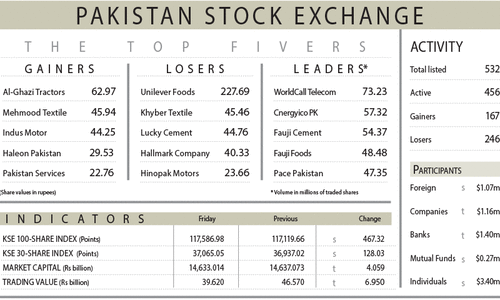RIYADH, Dec 6: Taking a cue from the Opec decision last week to defer cutting output to its next meeting, oil markets took a deep plunge, crashing by more than nine per cent and reaching the lowest level in almost four years.
Amidst compelling signs of a global economic meltdown and with the US National Bureau of Economic Research (NBER) confirming that the economy was now in recession, the US light crude for January delivery has now fallen by almost $100 off the record $147.27 peak recorded on July 11.
And while energies remained focused on the outcome of the Cairo Opec meeting, when none other than King Abdullah himself came out with a figure of $75 a barrel as a fair price for crude, it did not receive the attention it deserved. In fact this was the first time in recent years that someone as influential as Saudi Arabia from within Opec gave an indication of what it meant by fair price.
Although not everyone, appeared to be approving the ‘price floor’ Riyadh was endeavouring for, with New Delhi and Tokyo already showing signs of disapproval, major Western capitals seem to have heaved a sigh of relief. It at least confirmed that Opec would not seek to push crude prices back to $100 a barrel during a recession, analysts underlined.
However, in the wake of the Opec decision, many appear to question the ability of the cartel to act as a group and influence the market significantly. Over the summer, Opec could not prevent oil prices from surging to record levels even when its production was near peak levels. Now, the producers seem equally unable to stop prices from collapsing as the global economy cools down, some believe. “The Opec meeting last weekend shows you that there’s not a lot the group can do to stop the free fall in oil prices,” said Phil Flynn, analyst for Alaron Trading in Chicago.
Others felt the delay in decision to cut output could prove costly for the cartel. It has typically taken three to six months for oil prices to rise after Opec trims supplies, Deutsche Bank says. “The longer Opec waits to cut supplies, the higher stocks rise and the longer we think it’ll take for fundamentals to tighten once the tide does turn,” Jan Stuart of UBS in New York emphasised.
However, before acting in haste, Opec had other considerations too. Over the last decade, Opec has stepped in three times with large production cuts to stop prices from falling - in 2001, 2003 and 2006. Only once, however, did producers fully comply with their pledges to trim their output, analysts at Barclays underline. When prices last fell toward $50 a barrel, at the end of 2006, Opec agreed to cuts, totalling 1.7 million barrels per day but they could achieve a cut of only 900,000 bpd.
The situation appears same now. A Reuters survey reported supply from Opec fell to 31.2 million bpd in November from 32.17 million bpd in October. The 11 members bound by output targets pumped 28.07 million bpd, down from 29.06 million bpd in October, representing only 66 per cent of the Opec’s pledge to cut output by 1.5 million bpd from Nov 1.
The issue of compliance seems getting to the centre-stage now. There were definite fireworks at the Intercontinental in Cairo Opec moot, with Saudi Arabia and other Gulf Arab producers’ insisting on tighter adherence before making their next move.
Saudi Oil Minister Ali Al-Naimi believes Opec would not need to make a further cut in oil supply when it meets in Algeria if producers comply with previous curbs and fuel stocks decline.
“We are concerned about overproduction,” said Qatari oil minister Abdullah Al-Attiyah. Kuwaiti oil minister Mohammad Al-Olaim underlines: “The market conditions require us to be 100 per cent compliant.”
Fingers were reportedly raised towards Iran and Venezuela, often regarded as hawk within the grouping. Petrologistics estimated last week that, based on shipping data, Iran’s production fell by 80,000 bpd in November, much less than the 199,000 bpd it was due to cut.
Estimates show Saudi Arabia and its neighbours had made good on their share of Opec’s two million bpd of cuts since September. Data from Petrologistics estimated Opec output losing 1.22 million bpd last month, with nearly half of that reduction shouldered by Saudi Arabia alone, though Riyadh is responsible for only about a third of output.With the global oil demand set to contract and inventories continuing to swell, Opec will have to show greater discipline within its ranks. And before attempting to co-opt non-Opec members such as Russia in its output restraint regimen, as some are endeavouring today, Opec definitely needs to put its own house in order first.













































Dear visitor, the comments section is undergoing an overhaul and will return soon.